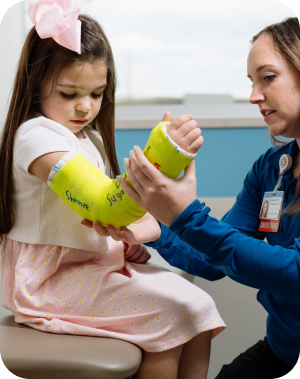fetal imaging
This page provides details about the following fetal imaging services: fetal cardiology, fetal ultrasound, fetal MRI, fetal CT, and fetal echocardiogram.


fetal imaging
On this page you will find information for the following fetal imaging services:
- fetal cardiology
- fetal ultrasound
- fetal MRI
- fetal CT
- fetal echocardiogram
fetal imaging services
At Dayton Children’s, we offer advanced fetal imaging services to help provide the best care for both mother and baby.
what is a fetal echocardiogram?
A non-invasive ultrasound study of the heart of a fetus. It is harmless and painless to the patient and fetus.
why a fetal echocardiogram?
Allow for diagnosis of fetal congenital heart conditions, such as structural heart defects and abnormal fetal heart rhythms.
learn more here about fetal cardiology services
The use of ultrasound is critically important to the current practice of obstetrics and gynecology. Ultrasound is used throughout pregnancy for a variety of indications such as to measure the size of a fetus and establish estimated date of delivery, evaluate how much amniotic fluid surrounds the fetus, to evaluation of the status of the cervix, and to evaluate a variety of types of fetal activities that are associated with fetal well-being. Ultrasound is also used to evaluate the developing fetus for possible congenital abnormalities.
what is a fetal ultrasound?
Fetal ultrasound is a test that lets your doctor see pictures of your baby. Your doctor learns information about your baby from the ultrasound. You may find out, for example, if you are having a boy or a girl. But the main reason you have this test is to get information about your baby’s health. The findings of an ultrasound fall into two basic categories:
Normal fetal ultrasound
- The fetus is the right size for its age.
- The placenta is the expected size and does not cover the cervix.
- There is the right amount of amniotic fluid in the uterus.
- No birth defects can be seen.
Abnormal fetal ultrasound
- The fetus is too small or too large for its age.
- The placenta covers the cervix.
- There is too much or too little amniotic fluid in the uterus.
- The fetus may have a birth defect.
An abnormal fetal ultrasound seems to imply that something is wrong with your baby. But what it means is that the test has shown something the doctor wants to take a closer look at. Keep in mind that an abnormal finding on an ultrasound, after it’s coupled with more information, may:
- Turn out to be nothing.
- Turn out to be something mild that won’t affect the baby.
- Turn out to be something more serious. But if this happens, early diagnosis helps you and your doctor plan treatment options sooner rather than later.
On occasion, it can be difficult to adequately image a fetus with ultrasound. Late in gestation, the bones of a fetus are more calcified making it more difficult for the ultrasound waves to adequately evaluate the internal organs of the fetus. Also, later in pregnancy, the fetal head may be positioned deep in the mother’s pelvis making it difficult to fully evaluate by ultrasound. When ultrasound fails to completely demonstrate the fetal anatomy of concern, providers may order a fetal magnetic resonance imaging (MRI).
how does fetal MRI work?
MRI uses a large tube-shaped magnet, pulses of radiofrequency waves, and a computer to create images of your baby. It does not require intravenous contrast material (dye) or sedation to complete. It is safe for both the baby and for the mother.
MRI studies are high detail and are used to get a better look at the baby’s:
- Brain
- Spine
- Face and neck
- Chest and lungs
- Abdomen and pelvis (including the bowel, kidneys, and bladder)
- Placenta
When you arrive for a fetal MRI, you’ll be asked to change into a hospital gown to help make you more comfortable during the scan and to keep you safe during the scan. Before the exam, the MRI technologist will explain the procedure and what you can expect during the study. This will allow you to ask any questions you may have about the MRI procedure itself. Because metal can interact with the magnetic field produced by the MRI machine, it’s important for your safety to tell us if you have any implanted medical devices, such as a cardiac pacemaker or orthopedic device.
During your study, you will lie on the MRI table that slides into a large, tube-shaped machine. You may lie on your side or back, whichever is most comfortable for you. A special “surface coil” is placed along your abdomen to help get more detail of your baby’s anatomy. You will be offered video goggles and headphones so that you can watch a movie of your selection or listen to music of your choice during the study. The headphones and microphone in the MR scanner also allow you to talk with MR technologist during the scan. The study takes 30 to 40 minutes to complete. The scan is designed to obtain images of the baby very quickly so that any movement of the baby can be accommodated. The radiologist and MRI technologist work collaboratively during the scan to make sure the MR images are in the correct location to fully evaluate your baby.
what happens after the fetal MRI?
The MRI provides a more detailed picture of your baby than on the ultrasound. The MR images will help your physician better explain the ultrasound findings and discuss with you the care you and your baby may need going forward.
can any radiologist perform a fetal MRI?
Not all radiologists are trained to interpret a fetal MRI. It’s a specialty that’s not offered at all medical facilities. We perform about 75 fetal MRIs a year. We follow the most up-to-date fetal imaging literature and procedures. Our radiologists are trained in fetal MRI and help your provider anticipate any special needs your baby may need at delivery or later. Your provider may even have you meet with pediatric specialists who care for infants and children with needs similar to your baby.
what is a low-dose fetal CT scan?
For a small subset of babies with severely abnormal bones, ultrasound may not provide all the answers. If this is the case, your team of specialized maternal-fetal medicine experts, geneticists and radiologists may recommend a low radiation dose fetal computed tomography scan (low-dose fetal CT).
A low-dose fetal CT scan offers a three-dimensional view of the baby that shows the fetal bones in superior detail. This detailed view can help your providers reach a final diagnosis.
Many patients feel concerned about the use of fetal CT because of its use of radiation. In the case of fetal CT scans, our aim at Dayton Children’s is to keep the radiation as low as possible. Low-dose CT scans are only performed in the second and third trimesters of gestation, when the baby’s organs have already formed and developed, and not during the first trimester, when the baby is most sensitive to radiation.
If you have any questions or concerns, we encourage you to speak with our team members for more information.
what to expect
Before starting the exam, the CT technologist will explain the low-dose fetal CT scan to you and let you know what to expect. Fetal CT does not require contrast (dye) or sedation. You will lie on your back on the CT table. We will place a bolster under your knees to help you feel more comfortable.
The fetal CT appointment time is relatively fast, lasting overall approximately 30 minutes. However, the actual scan time is just a few seconds. The CT technologist will talk with you throughout the imaging study.
The CT machine is one large doughnut-like machine with a shorter and wider tube and feels less closed in than an MRI system. Capturing the images takes just a few seconds and you will be ready to move off the CT table very quickly after the scan is done.
After the scan is completed, the radiologist will examine the images by isolating the fetal bones and reviewing them as 3-D pictures. The imaging findings will then be discussed with the geneticists and maternal-fetal medicine specialists, who will reach a diagnosis together.
what is a fetal echocardiogram?
It is a non-invasive ultrasound study of the baby’s heart. It is harmless and painless to both you and your baby. Fetal echocardiograms allow for diagnosis of fetal congenital heart conditions, such as structural heart defects and abnormal fetal heart rhythms.
what to expect
The fetal echocardiogram scanning will be performed by an ICAEL certified sonographer. After your echocardiogram, you will have a consultation with one of our pediatric cardiologists. The consultation will include:
- Review of the findings of the echocardiogram.
- Counseling regarding treatment options.
- Recommendations for delivery, care of baby after delivery and any medications and/or surgical interventions. Learn more about Dayton Children’s fetal cardiac clinic here.

contact us
Do you have questions about your pregnancy and wonder if our services could be of assistance? Patients may contact our nurse navigator through the button below or at 937-641-3708.
here when you need us
Whether you’re looking for the right provider, ready to make an appointment, or need care right now—we’re here to help you take the next step with confidence.
